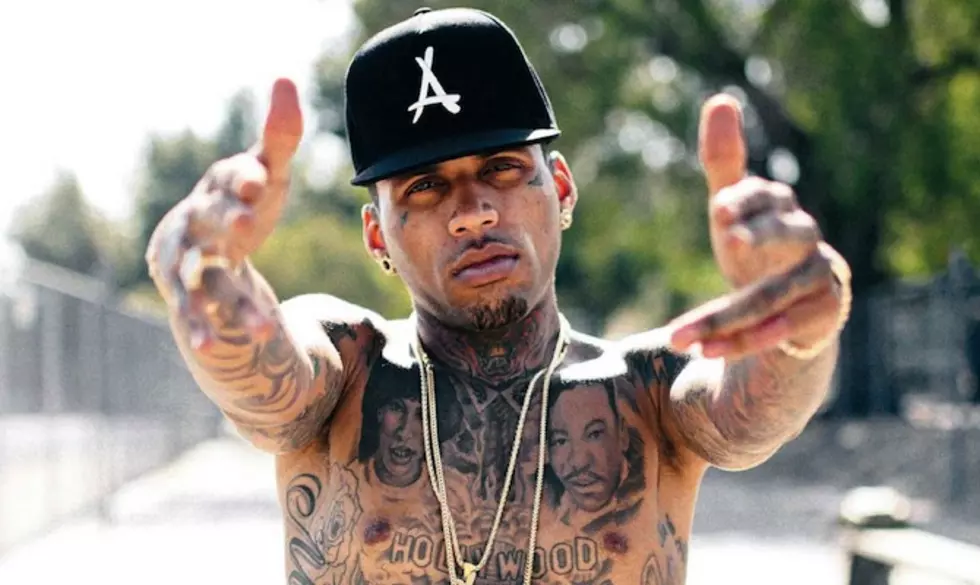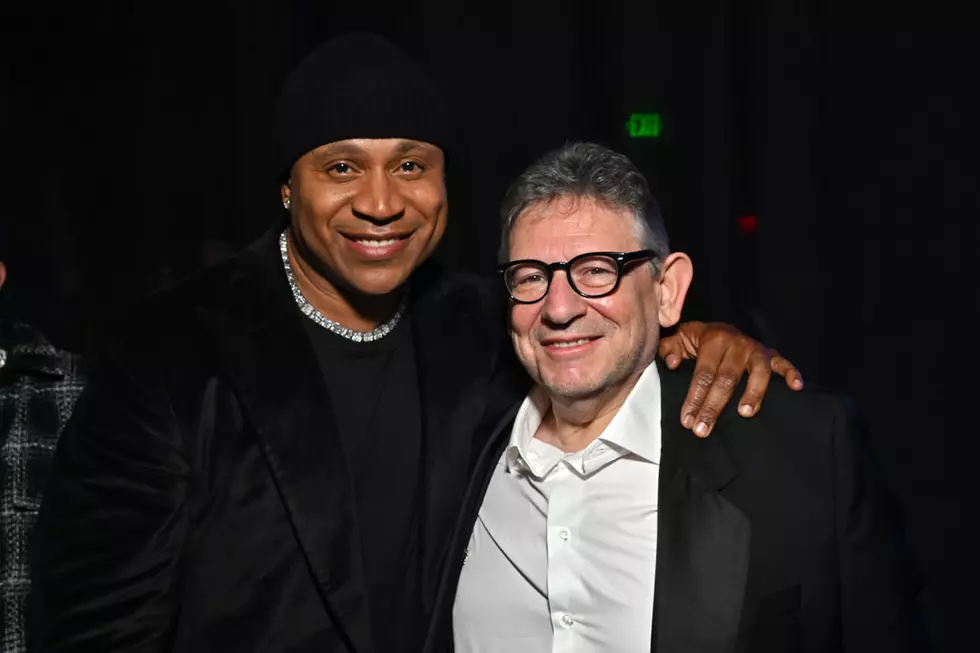
Kid Ink Is At The Top Of His Game, And He’s Just Getting Started
Stay With Me
Hip-hop's been really feeling Kid Ink lately, and he's just getting started.
Words kris ex
Editor’s Note: This story originally appeared in the August/September 2014 issue of XXL Magazine.
“You could say that the first time you met Kid Ink he had a snake on his head,” he says with a wide smile. “And a blunt in his hand.” This could be said because it’s true. Brian Todd Collins, the 28-year-old rapper from Los Angeles, is dressed in bleach-commercial white from head to toe. His outfit is accented by no small amount of jewelry dripping and clinking from his neck, wrists and fingers. Gripped lightly in his right hand is a Swisher Sweet cigar that’s plump-filled with Magna Carta marijuana. Atop his head, circling the brim of his white Alumni baseball cap, is a snake—not a python but not a finger-sized garter snake—wrapping around his headgear. Because this is normal.
At least he makes it seem normal. Part of it has to do with the location. The photography studio where he’s recording the video for “Delirious (Boneless)”—a fist-pumping electro house track that serves as the first single for producer Steve Aoki’s forthcoming album, Neon Future I—is located in the heart of Los Angeles’ Mid-City neighborhood and is literally around the corner from the blocks Kid Ink ran up and down as a kid. “I wasn’t born right here, but I was raised right here,” Ink says. “To be running these streets from elementary school to after graduating high school and then to be back and see the same bus stops and all that [is crazy]. Nobody else at this video shoot is having this moment—they’re all from other sides of the world. It’s just a regular video for them. It’s funny.”
“I was helping so many people grow their digital business, and then they would just disappear,” he says. “I was just like, ‘I can’t keep letting that happen to me. I need to find my own Wiz Khalifa, my own Drake, my own Tyga.'" —DJ Ill Will
Inside the studio, there’s the usual retinue of weed carriers and fashionistas and production assistants. There’s also a young lady dressed very I, Robot and a muscle-bound man looking like Khal Drogo on ’roids. Ink moves through the set nonplussed by the stirrings, comings and goings. He’s of the room, above and beyond it with a quiet je nais se quoi—an unassuming alpha male, an undeniable star without heavy gravity. “This shit is normal to him,” says DJ Ill Will, founder and CEO of Tha Alumni Music Group. Will is an Indiana-born former mixtape DJ who has produced music videos and hosted mixtapes for most of the big and small of the past five years of L.A. rap and R&B—Top Dawg Entertainment, YG, Chris Brown, Ty Dolla $ign, Tyga, Glasses Malone, Bishop Lamont—as well as Wiz Khalifa, Meek Mill and Soulja Boy. Starting his career just as the mixtape scene was restructuring itself in the wake of fellow DJ-turned-executive DJ Drama’s 2007 arrest, Will prospered through his ability to get his work placed prominently on taste-making blogs and online music hubs—but he was never able to capitalize on his efforts beyond the short term. “I was helping so many people grow their digital business, and then they would just disappear,” he says. “I was just like, ‘I can’t keep letting that happen to me. I need to find my own Wiz Khalifa, my own Drake, my own Tyga. Y’all are getting rich, cool—we didn’t sign any paperwork. But I’m not going to be a sucker forever. I’m gonna find my own.’”
Also concerned with how long he could operate within the legal gray areas of the mixtape game, Will formed Tha Alumni Music Group, taking the name of his never-completed compilation album, DJ Ill Will: Tha Alumni. (“I take my hat off to DJ Drama and DJ Khaled because that’s a lot of work to chase that many people down to get a whole album,” he says. “I just gave up on that.”) Will had been a fan of Ink’s music, and when he first saw the rapper, he decided he had found the type of career artist who was worth changing lanes for. “I met him off La Brea, in a place where I don’t want to go,” Will recalls. “I was like, ‘This kid is in a room full of other stars and he stands out.’ One thing I thought was amazing about him early on was he knew how to make records immediately. I was making money in mixtapes, so for me to put that to the side and focus [on a record label]—I didn’t want to just have some kid that raps that doesn’t know how to make music. He came in ready out the gate and knew how to make music that could appeal to the masses and not in a sellout way because he’s from the streets.”
A few feet away, Ink is running through his verses. The song was originally an instrumental track, tailor made for Las Vegas clubs and oversized beach parties. In Ink’s hands it’s become an ode to weed, women and partying full of melody, playful rhyme schemes and subliminal nods to street life. He’s performing for the camera, but he’s really not. Everything about him says that he’s not turning up but just being him and the cameras just happen to be there.
The title to Kid Ink's major label debut, My Own Lane, which dropped this past January on RCA via Alumni, isn’t just standard rapper self-delusion. From the first number—the piano-heavy, incredibly pop-savvy “Hello World”—it’s clear that there aren’t many artists making the kind of music he specializes in. A learned instrumentalist, producer and engineer, Ink routinely name checks Pharrell Williams as one of his influences, and it’s easy to see why: In his world, mainstream popular music and underground street sensibilities bleed over into one another. But his most logical antecedent would be St. Louis’ Nelly, who rose to fame by appropriating a playground jingle to rap about cruising about town in a high-priced SUV with a loaded automatic rifle. “Show Me,” Ink’s biggest hit to date, has similar cues. It’s subtly naughty: “Baby, let me put your panties to the side,” says the hook—which is downright chivalrous in a world where Ty Dolla $ign’s loosely similar song asks, “Can you really take dick or nah?” Likewise, Ink’s statements are full of objectification masquerading as respect and charm: “Mommy, you remind me of something / I don’t know what it is” and “My bad if my ex tried to fight you.” But compared to sentiments like “these hoes ain’t loyal,” it’s actually progressive and laudable.
“I like to go in and record freely and know that I can have any type of song no matter what the tempo is and just handle that. —Kid Ink
For Ink’s subversion of base tropes, “Show Me” went platinum in March and spent 18 weeks atop Billboard’s Rap Airplay Chart, breaking the record set by Juvenile’s “Back That Thang Up” in 1999. And while it seems like a no-brainer, the song’s genesis is at once more cynical and more organic than face value would dictate. “When we went to make that record, [parent label] RCA was putting a gun to our head saying ‘We can’t work your music unless it’s more urban. Urban Radio is not fucking with Kid Ink, only Rhythmic Radio,’” recalls Will.
“It was to the point where I was recording five songs a session,” says Ink. “I like to go in and record freely and know that I can have any type of song no matter what the tempo is and just handle that. But it was to the point where we were hitting deadlines and if we wanted a single release at this time or an album release at this time, we needed it by this time. So I was focused on just making a single, which meant that sometimes music got forced and sometimes you would feel like you were just doing something to make a single and you were losing your creativity. But it got to a point where, after hitting a stressing point, you just blacked out and went right back and reverted to the starting point, and once I stopped caring about it, I think it became easier.”
Will and Ink decided to call in their friend of many years and “the most hood producer we know,” DJ Mustard, who, while having a few hits under his belt had not yet reached the nigh-ubiquitous hood status that he’s currently enjoying. After about a week of working, the song—built from a deconstruction of Robin S.’s 1990’s dance floor classic “Show Me Love”—began to take form. Mustard collaborator TeeFLii—the South Central singer best known for the raunchy “This D”—helped with the hook, and later Chris Brown came by and redid it. “The shit was hood as hell when we cut that record,” says Will. “The power made it a pop record, but the foundation is as street as it gets.”
“The single just came naturally,” says Ink. “Linking up with Chris just came naturally. Nothing was forced. It was all just a moment and something that happened all on its own.”
And Ink’s got a lot more in store.
Related: Review: Kid Ink Is Unpredictable And Entertaining On My Own Lane
Kid Ink Sets A New Billboard Record
Kid Ink Says He Smokes An Ounce A Day
Kid Ink Almost Included Pharrell On His Album
More From XXL









